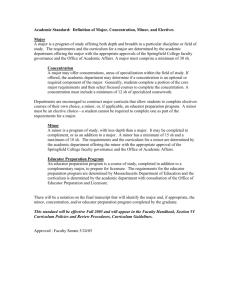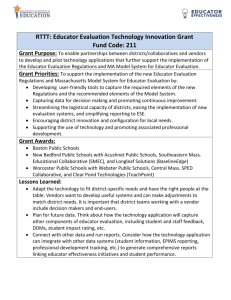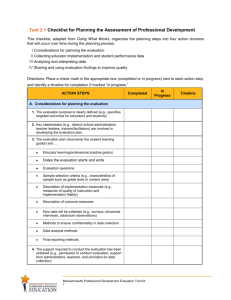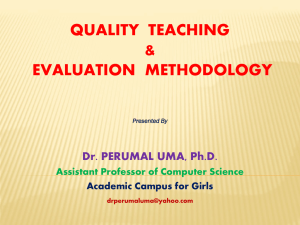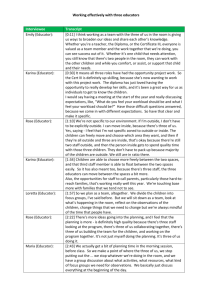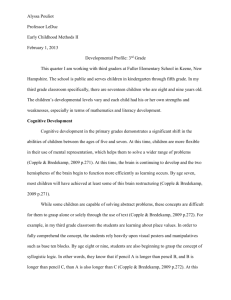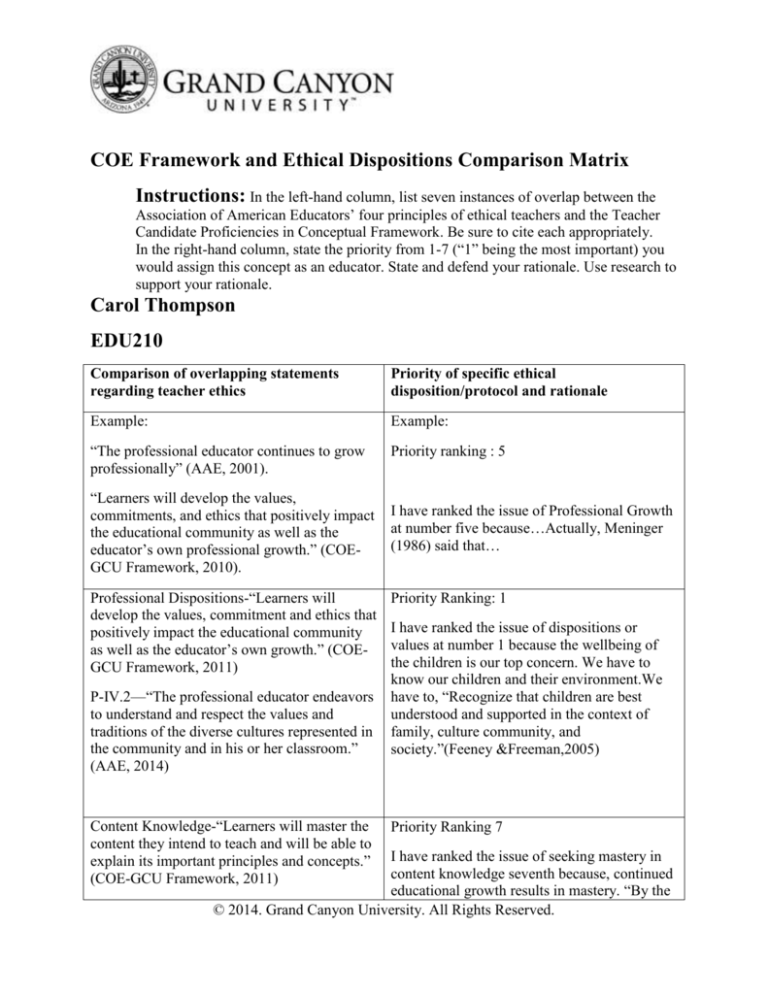
COE Framework and Ethical Dispositions Comparison Matrix
Instructions: In the left-hand column, list seven instances of overlap between the
Association of American Educators’ four principles of ethical teachers and the Teacher
Candidate Proficiencies in Conceptual Framework. Be sure to cite each appropriately.
In the right-hand column, state the priority from 1-7 (“1” being the most important) you
would assign this concept as an educator. State and defend your rationale. Use research to
support your rationale.
Carol Thompson
EDU210
Comparison of overlapping statements
regarding teacher ethics
Priority of specific ethical
disposition/protocol and rationale
Example:
Example:
“The professional educator continues to grow
professionally” (AAE, 2001).
Priority ranking : 5
“Learners will develop the values,
commitments, and ethics that positively impact
the educational community as well as the
educator’s own professional growth.” (COEGCU Framework, 2010).
I have ranked the issue of Professional Growth
at number five because…Actually, Meninger
(1986) said that…
Professional Dispositions-“Learners will
develop the values, commitment and ethics that
positively impact the educational community
as well as the educator’s own growth.” (COEGCU Framework, 2011)
P-IV.2—“The professional educator endeavors
to understand and respect the values and
traditions of the diverse cultures represented in
the community and in his or her classroom.”
(AAE, 2014)
Content Knowledge-“Learners will master the
content they intend to teach and will be able to
explain its important principles and concepts.”
(COE-GCU Framework, 2011)
Priority Ranking: 1
I have ranked the issue of dispositions or
values at number 1 because the wellbeing of
the children is our top concern. We have to
know our children and their environment.We
have to, “Recognize that children are best
understood and supported in the context of
family, culture community, and
society.”(Feeney &Freeman,2005)
Priority Ranking 7
I have ranked the issue of seeking mastery in
content knowledge seventh because, continued
educational growth results in mastery. “By the
© 2014. Grand Canyon University. All Rights Reserved.
P-II---“The professional educator assumes
responsibility and accountability for his or her
performance and continually strives to
demonstrate competence.” (AAE, 2014)
end of their programs the College expects to
produce highly effective teachers and
principals who have the knowledge, skills, and
dispositions to effect change in their students,
their schools and their communities.”(COEGCU Framework,2011)
Pedagogical Content Knowledge and skills --“Learners will develop an understanding of the
relationship between content and content
specific pedagogy, instructional strategy and
technology.”(COE-GCU Framework, 2011)
Priority Ranking 4
P-II.3—“The professional educator continues
professional growth.”(AAE,2014)
Professional and Pedagogical Knowledge and
Skills—“Learners will be able to develop
meaningful learning experiences that improve
student learning and achievement, collaborate
with other educational professionals and reflect
on their practice.”(COE-GCU Framework,
2011)
P-IV—“The professional educator recognizes
that quality education is the common goal of
the public boards of education, and educators,
and that a cooperative effort is essential among
these groups to attain that goal.”(AAE,2014)
Data Informed Decision Making—“Learners
will use data to make informed decisions about
student learning and achievement, continuous
school improvement, and professional
practice.”(COE-GCU Framework,2011)
P-I.5—“The professional educator endeavors
to present facts without distortion, bias, or
personal prejudice.”(AAE,2014)
I have ranked the issue of content knowledge
growth fourth because highly qualified
teachers need to have a clear understanding of
all educational content. According to Copple
and Bredekamp, teachers must be well
prepared, participate in ongoing professional
development and receive sufficient support and
compensation.
Priority Ranking 5
I have ranked the issue of educational skills
fifth because everyone students, parents,
teachers, administrators, and communities
must work collaboratively to reach educational
success. “That good teaching requires expert
decision making means that teachers need solid
professional preparation, as well as on-going
professional development and regular
opportunities to work collaboratively.” (Copple
& Bredekemp,2009)
Priority Ranking: 2
I have ranked the issue of Data decisions
second because much information is needed to
scaffold learning strategies for children. This
issue is supported by NAEYC,I-1.7, “To use
assessment information to understand and
support children’s development and learning,
to support instruction, and to identify children
who may need additional services.”(Feeney&
Freeman,2005)
© 2014. Grand Canyon University. All Rights Reserved.
Performance Assessment—“Learners will
align educational objectives to content and
professional education standards as well as
design formative and summative assessments
including rubrics that analyze student learning
and teacher effectiveness.”(COE-GCU
Framework,2011)
Priority Ranking: 3
I have ranked the issue of Assessments as third
because assessments are used to plan lessons
that are developmentally appropriate for
children. “Appropriate assessment benefits
children ,teachers, administrators and parents.”
(Marion,2011)
P_II.4—“The professional educator complies
with written local school policies and
applicable laws and regulations that are not in
conflict with this code of ethics.” (AAE,2014)
Technology Integration—“Learners will be
able to select and use applicable technology to
enhance learning experiences.”(COE-GCU
Framework,2011)
P-I.3—“The professional educator continues
professional growth.”(AAE,2014)
Priority Ranking:6
I have ranked this issue of technology
integration number 6 because technology is
used to magnify learning. “Teachers make
thoughtful use of computers and other
technology in the classroom, not to replace
children’s experience with objects and
materials, but to expand the range of tools with
which children can seek information, solve
problems, perform transformations, and learn
at their own pace.”(Copple& Bredekamp,
2009)
References
Association of American Education retrieved on December 6, 2014 at
www.aaeteachers.org
(2011). College of Education Conceptual Framework Grand Canyon University, Phoenix
Arizona
Copple C,& Bredekamp S. (2009). Developmentally appropriate practice in Early childhood
programs.Washington, D.C. NAEYC
Feeney, S. & Freeman N.K. (2005).Ethics and the early childhood educator:Using the
n.a.e.y.c. code.Washington D.C. NAEYC
Marion,M.(2011).Guidance of young children.Boston M.A.:Pearson
© 2014. Grand Canyon University. All Rights Reserved.
© 2014. Grand Canyon University. All Rights Reserved.



